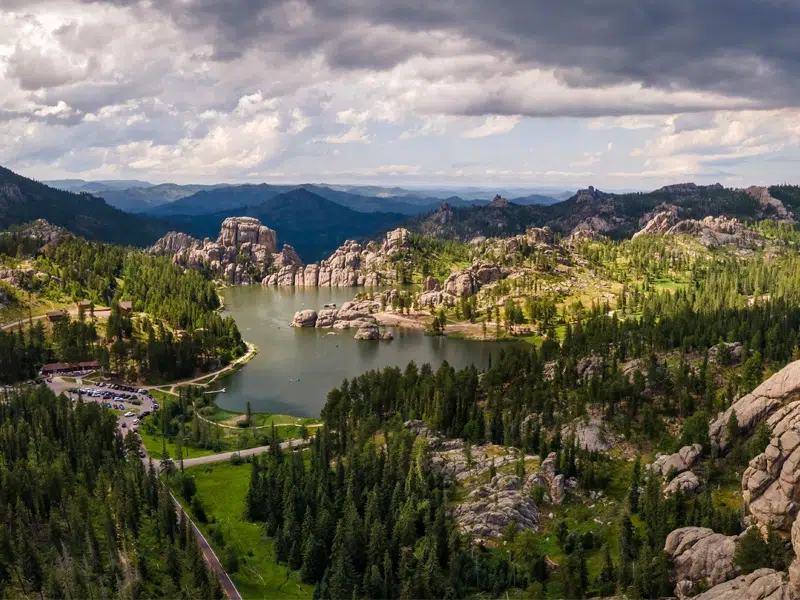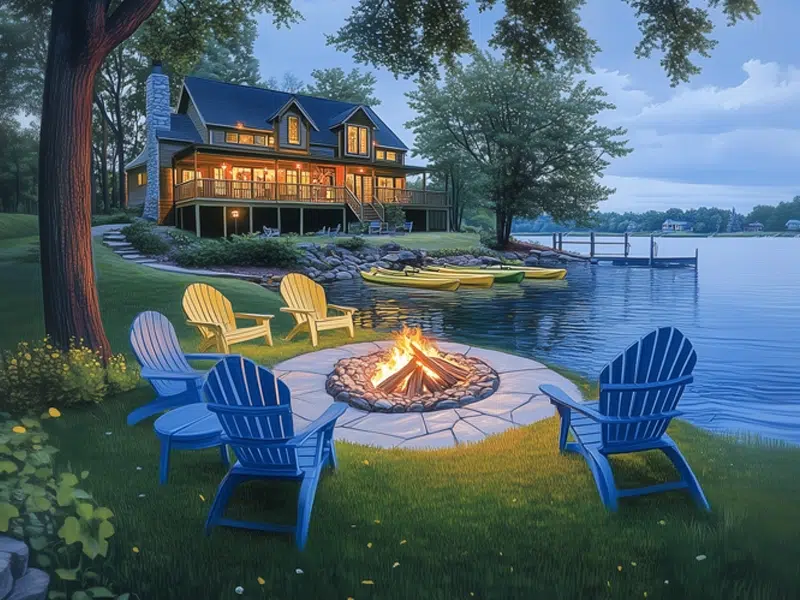South Dakota Short-Term Rental Regulations and Airbnb Laws
South Dakota’s varied landscape, from the scenic Black Hills to vibrant cities like Sioux Falls, the Airbnb laws and regulations for short-term rentals balance the interests of property owners with those of the broader community by addressing safety, zoning, insurance nuances, and more.
If you have questions about short-term vacation rentals in South Dakota, contact Proper Insurance. Our agents are experts in the vacation rental industry. Call 888-631-6680 today.

State-Imposed Short-Term Rental Regulations in South Dakota
South Dakota recognizes the importance of short-term rentals in contributing to the local economy, especially in areas with significant tourist attractions like Mount Rushmore, Badlands National Park, Black Hills National Forest, Crazy Horse Memorial, Deadwood, Sioux Falls, and more. The state’s regulations aim to provide clear guidelines for hosts and ensure that operations are conducted legally and responsibly.
Tax Obligations
One of the key aspects of state regulation involves tax collection and remittance:
- Sales Tax: Hosts are required to collect South Dakota state sales tax on the rental amount charged to guests. The current rate can be found on the South Dakota Department of Revenue’s website.
- Tourism Tax: A tourism tax may apply to short-term rentals in South Dakota. This tax is to be collected from guests and remitted to the state.
- Registration: Hosts must register with the South Dakota Department of Revenue to obtain a tax license, which allows them to collect and remit these taxes legally.
Licensing and Permits
While South Dakota does not impose a statewide licensing requirement specifically for short-term rentals, it’s important for hosts to:
- Check for state health and safety regulations requiring compliance or inspections.
- Ensure they have any necessary state business licenses that may apply to operating a lodging facility, like a short-term rental.
Statewide Policies
South Dakota may implement additional policies affecting short-term rentals, covering areas such as:
- Minimum Stay Requirements: Any state-level restrictions on how long guests can stay.
- Advertising Standards: Guidelines for advertising short-term rentals, including any mandatory disclosures about taxes or licenses.
Compliance and Enforcement
Adherence to these state-imposed regulations is crucial for the legal operation of short-term rentals in South Dakota. Non-compliance can result in penalties, including fines and the potential loss of the ability to operate.
- Stay Informed: Regularly check for updates on regulations from the South Dakota Department of Revenue and other relevant state agencies.
- Professional Consultation: Consider consulting with tax professionals or legal advisors to ensure comprehensive compliance with state short-term rental regulations.
Understanding and following these state-imposed regulations is the first step for any host looking to run a short-term rental in South Dakota. Compliance not only avoids legal issues but also contributes to the positive development of the short-term rental market within the state.
Local Jurisdiction for Short-Term Rentals in South Dakota
While the state of South Dakota provides a general framework for the operation of short-term rentals, the specifics of regulation, enforcement, and compliance can vary greatly at the local level. Municipalities and counties across the state have the authority to implement their own rules, tailored to the needs and concerns of their communities.
Zoning and Land Use Laws
Local zoning ordinances play a critical role in determining where short-term rentals can operate. Municipalities may designate specific zones where such rentals are permitted or require special permits for operation in residential areas. Key considerations include:
Permitted Zones: Identification of areas within the municipality where short-term rentals are allowed.
Special Use Permits: Hosts must obtain permits to indicate compliance with local standards and conditions for operation.
Licensing and Registration Requirements
In addition to state registration for tax purposes, local jurisdictions may impose their own licensing or registration requirements for short-term rentals. This often involves:
Local Business Licenses: Application for a business license specific to short-term rental operations, with possible renewal requirements.
Short-Term Rental Permits: Acquisition of a short-term rental permit, subject to local regulations, fees, and inspection requirements.
Health, Safety, and Building Codes
To ensure the safety and well-being of guests, local jurisdictions may enforce health and safety standards and adherence to building codes. Even if health and safety standards are not enforced in your area, you should always aim to provide your guests with a safe and healthy stay.
Safety Inspections: Mandatory inspections to verify compliance with local fire safety, health, and building standards.
Amenity Regulations: These regulations require basic amenities and safety equipment, such as smoke detectors and fire extinguishers.
Neighborhood Considerations
Local ordinances may also address potential impacts on neighborhoods, focusing on maintaining the quality of life for residents. This can include regulations on:
Noise and Nuisance: Restrict noise levels with specific quiet hours to minimize disturbances to neighbors.
Parking: Guidelines on providing adequate parking for guests without adversely affecting neighborhood parking availability.
Trash Management: Rules regarding the disposal and management of trash and recyclables by guests and hosts.
Navigating Local Compliance
Understanding and navigating local regulations is crucial for hosts in South Dakota to operate short-term rentals legally and successfully.
Research Local Ordinances: Consult the official websites of the local municipality or county for up-to-date information on short-term rental regulations.
Community Engagement: Proactively engage with local authorities, neighborhood associations, and community members to understand your area’s concerns and expectations for short-term rentals.
Documentation and Record Keeping: Maintain records of licenses, permits, and compliance with local regulations to facilitate renewals and address any disputes.
Adhering to local jurisdiction regulations is essential for short-term rental hosts in South Dakota. By staying informed and proactive in compliance efforts, hosts can ensure their operations contribute positively to the local community and economy, fostering a sustainable environment for short-term rentals.
Other Considerations for Short-Term Rentals in South Dakota
Beyond the foundational compliance with state and local regulations and guidelines, short-term rental hosts in South Dakota should consider several other factors to ensure a successful, sustainable, and responsible rental operation. These considerations can enhance the guest experience, improve community relations, and potentially increase the profitability of your rental business.
Insurance Coverage
Adequate insurance is crucial for protecting both the property and the host from potential liabilities and property damage associated with short-term renting. Standard Homeowners and Landlord policies may not cover activities related to short-term renting, so it’s essential to:
- Review Your Policy: Ensure that your insurance coverage specifically includes short-term rental business activities. Even if you add a short-term rental endorsement, also known as a rider, there are still key areas where a Homeowners or Landlord/Dwelling policy falls short. When a property is used for short-term rentals, it straddles the line between a personal residence and a commercial operation, introducing massive coverage gaps for the insured.
- Upgrade Your Insurance: Proper Insurance leads the short-term vacation rental insurance market, having developed a specialty policy covering business and personal use of your property. This policy not only provides comprehensive protection against common exposures like liability, property damage, and loss of revenue, but it also includes enhancements tailored to the needs of short-term rental owners, like coverage for bed bugs/fleas, squatters, and guest theft/damage.
Community Engagement
- Good Neighbor Relations: Maintain open lines of communication with your neighbors. Inform them about your short-term rental operation and provide them with contact information in case issues arise during a guest’s stay.
- Community Contribution: Consider ways your short-term rental can contribute positively to the local community, such as recommending local businesses to your guests or participating in local clean-up or charity events.
South Dakota Hosts: Help Keep Us Informed on Regulations in Your Area
We frequently update our regulations pages as new information or updates are brought to our attention. If you know of a short-term rental regulation or Airbnb law in the state of South Dakota or specific to a local jurisdiction, please contact us through email at info@proper.insure so we can include it on our page.
Upgrade Your Short-Term Vacation Rental Insurance Today
Interested in a policy to protect you and your business from liability and damage claims? Proper Insurance is the nation’s leading short-term rental insurance provider, protecting homes in all 50 states and replacing inadequate Homeowners/Landlord policies. Our comprehensive coverage meets or exceeds standard short-term rental requirements with $1M Commercial Liability (CGL) and unmatched protection for your property and revenue. Additional custom coverages include guest-caused theft/damage, amenity liability (bikes, kayaks, hot tub, etc.), bed bugs, fleas, squatters, and more.
Please note: The information provided is intended as a guide and may not be comprehensive or current. Regulations may change and could vary by area or situation. Always consult local authorities or a legal professional to ensure you have the most accurate information for your short-term rental property.



